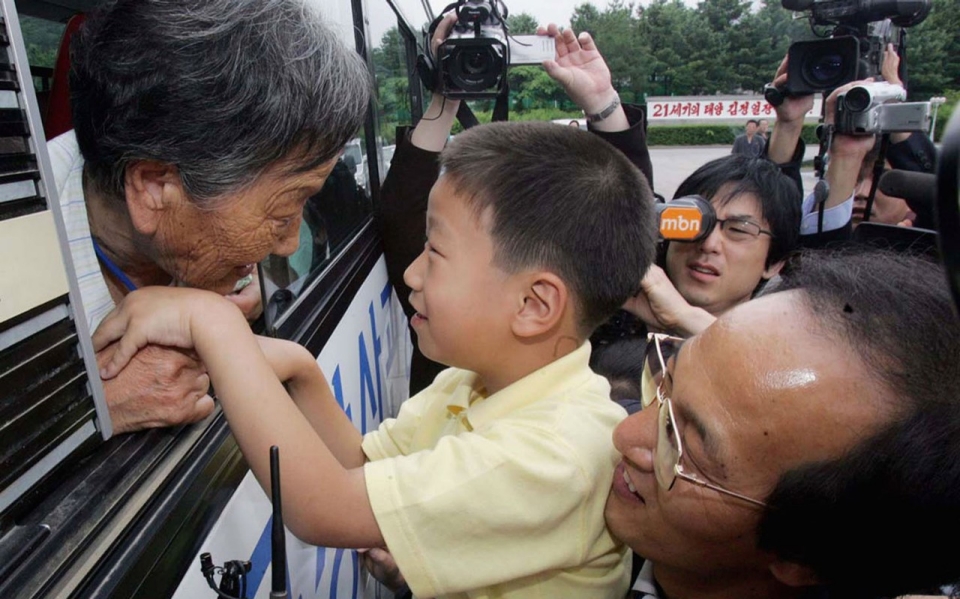South Korean Choi Gye-Wol (L) kisses the hand of her grandson Kim Chol-Bong as her son Kim Young-Nam watches before she returns to her South Korean home after the Separated Family Reunion Meeting on June 30, 2006, at Diamond Mountain in North Korea. (Lee Hun-Koo/Getty Images)
The Koreas issue needs to be about more than geopolitics, economics, or even security; at its heart, it should be about the (Korean) family.
In October 2020, then-candidate Joe Biden touched on this idea in an essay he wrote for Yonhap News Agency, arguing to make U.S. foreign policy around Korea about more than just denuclearization. He expressed support for the separated families writing, “I will never forget standing less than 100 feet away from North Korea at the [Demilitarized Zone] with my granddaughter. I felt the pain of division on the Korean peninsula and the separation of families since the Korean war.”
According to the National Coalition for the Divided Families, approximately 10 million Korean families were separated after WWII and the conflict surrounding the subsequent division of the peninsula. Even while there have been some efforts to reunite families, since 1985, only 44,000 families out of an estimated 10 million have participated in government-sponsored family reunions. Tragically, already 60% of those who registered to participate in the reunions have since passed away.
These 21 North Korea-South Korea (plus seven virtual) reunions have heavily depended on diplomatic relations between the North and the South. And due to the 70 plus years of tensions between North Korea and the United States, Korean American families have been largely left out of the conversation.
A bipartisan group of Southern California lawmakers introduced the Divided Families Reunification Act to prioritize connecting the over 100,000 Korean American families to “reunite with loved ones in North Korea.” Two Korean American Members of Congress, Rep. Young Kim (R-CA), an original co-sponsor of the bill, and Rep. Michelle Steel (D-CA), spoke at the International Forum on One Korea in February, expressing their hopes to reunite Korean American families with relatives in North Korea.
While engagements between North Korea and South Korea have happened on and off through the many years of division, the doors for a sustained effort to engage for reunification indeed took root with Rev. Sun Myung Moon’s 1991 visit to North Korea. As noted in The Atlantic, one of Rev. Moon’s most significant and lasting legacies would be in his “groundbreaking work” to open up the “Hermit Kingdom” to the rest of the world.
Rev. Moon’s son, Dr. Hyun Jin Preston Moon, wrote of his father’s experience with this in Korean Dream: A Vision for a Unified Korea:
I recall vividly as if it were yesterday, my father’s tearful face as he told me of his deep emotion when, in 1991, his life came full circle, and he was able to visit the family he had not seen in forty years. He met his two sisters, caressing the now-wrinkled cheeks of his younger sister, who was fourteen when he last saw her, and telling her, “How old you’ve become.” He offered his respects at his parent’s graves and visited his childhood home, things he had longed for throughout the forty-long years of separation.
When my father visited his mother’s grave, he had to stop his heart from breaking; it was difficult to keep his tears from flowing. Rather than focusing on his grief, however, he reminded himself of the suffering of his 20 million countrymen in the North. His true purpose for coming to North Korea was for them.
As more and more of those who had once registered to take part in a North Korea-South Korea family reunions are now in their 80s and 90s, we need to prioritize reuniting these separated families. It is worth noting that we should engage in this effort with a more significant dream in mind, one that can bring the separated families together – not just for a moment in time but for the rest of their lives.
To make this happen, Koreans worldwide can again embrace the dream of one united, free and independent Korea. And given the peace and prosperity benefits that will bring to the region and world, people everywhere will be able to celebrate their Korean Dream.
To learn more about the Korean Dream and the International Forum for One Korea 2021, visit: https://www.globalpeace.org/international-forum-one-korea-virtual-forum-series

